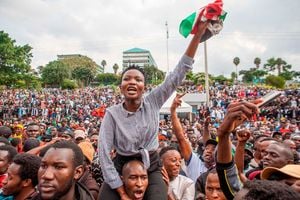
Former Prime Minister Raila Odinga makes his remarks during the launch of his bid for the African Union Commission Chairmanship candidate at State House, Nairobi on August 27, 2024.
It was an opening shot like Africa hadn’t seen before. On Tuesday Kenya launched the candidature of its former Prime Minister Raila Odinga for chairperson of the African Union Commission (AUC).
No previous election bid for the AU Commission had ever been launched with the pomp witnessed at Raila’s. In attendance at the State House Nairobi event were several East African Community (EAC) heads of State: EAC Chairman and South Sudan President Salva Kiir Mayardit, Tanzania President Samia Suluhu Hassan, Uganda President Yoweri Museveni, Burundi Prime Minister Gervais Ndirakobuca, Rwanda State Minister for Foreign Affairs James Kabarebe, former Tanzania President Jakaya Kikwete and former Nigeria President Olusegun Obasanjo, and other important men and women.
A few months ago, when Raila threw his hat in the AU Commission chieftain ring, it looked like a quixotic quest. In the wave of African youth’s weariness with the hold of the older generations that’s been sweeping the continent, his campaign came across as tone-deaf. At 79 years old, some argued he should retire, go back to Bondo, and harvest his trees.
Then, from the Horn of Africa, Djibouti confirmed it was fronting its 58-year-old Foreign Minister Mahmoud Ali Youssouf for the top AUC job. Youssouf’s bid was interesting, but not exciting. Unhelpfully, he has the charisma of a wet blanket.
Because it was East Africa’s turn to head the AU Commission, there were rumblings about fronting a younger candidate, and the lot seemed to fall on Tanzania’s ruling party CCM’s more youthful politician January Yusuf Makamba, who was then Foreign minister.
Makamba, 50, didn’t make an overt play for the job, though he occasionally dropped oblique comments in public and social media were read to suggest he wanted it. On African networks and WhatsApp groups, there was a lot of giddiness about him.
Expectations were so high about Makamba’s prospective candidacy, that some declared Raila’s goose cooked even before it got to the stove.
Raila’s election to lose
It was not to be. In July, President Suluhu dropped a bombshell and dismissed Makamba as Foreign minister. The possibility that he would make a play for the job evaporated. The fact that Raila had been to Tanzania and broken bread with President Suluhu sometime earlier, gave rise to wild conspiracy theories that they had cooked up a plot against Makamba.
When the nominations closed, the AU confirmed Madagascar’s former Foreign minister Richard Randriamandrato, and Mauritian lawyer and politician Anil Gayan, as the other candidates seeking to replace Moussa Faki Mahamat.
The race is now on to February 2025 when the election will be held.
Many think this is now Raila’s election to lose. A wily operator, Raila always had a good hand to play. In February, in one of the surprising events of the year, he appeared with his former bitter rival in the 2022 presidential election, President William Ruto at Uganda President Yoweri Museveni’s farm in Kisozi, 155 kilometres southwest of the capital Kampala.
Clutching herdsmen’s sticks and looking over Museveni’s cattle, it all hunky dory between the three men. Raila, famous for his pragmatism — and critics say malleable opportunism — seemed to have buried the hatchet with Ruto, whom he had taken to court disputing his election as stolen. Museveni, who had never been one of Raila’s leading fans, had been accused of backing Ruto in the election.
Clearly, the wagons were being circled. At the launch, Museveni showered Raila with pan-African praise. Events from far and wide seemed to have converged to bring him good fortune.
West African vote
Parts of Africa are in turmoil. In the Sahel region, jihadist extreme violent groups have been wreaking havoc in Mali and Burkina Faso, which in recent years have both fallen to military rule and making advances. Sudan’s deadly civil war is in its second year. The conflict has left over 15,000 people dead and displaced nearly 13 million people – with over 10 million of them remaining within Sudan, the largest displacement crisis in the world.
Most African countries are crashing under debt, and the continent’s restless youth are getting dangerously militant. There is a sense that the times call for a veteran hand like Raila, whose calls will be picked by African presidents, and foreign ministers in world capitals even though he might not have the energy to work 16-hour days all month.
He will have to jump a few hurdles. An African foreign policy expert in Nairobi says Raila could find the West African vote to be “treacherous”. Closer to home, he says Ethiopian Prime Minister Abiy Ahmed could throw him under the bus. With the AU headquartered in Addis Ababa, Ethiopia holds some sway.
And it could also be personal. Raila allegedly upset Addis Ababa when he made comments thought to be sympathetic to Tigray, during its November 2020-2022 bloody war with Ethiopia.
Raila’s late son, Fidel Castro Odinga, was married to Eritrean beauty Getachew Bekele. He left behind a beloved grandson. Raila is said to be close to Eritrea President Isaias Afwerki, Abiy’s ally against Tigray, but the two have since fallen out of love. But there is little there that a little Raila pragmatism can’t fix.
The author is a journalist, writer, and curator of the “Wall of Great Africans”. Twitter@cobbo3










